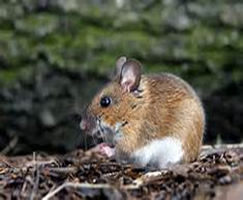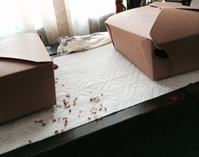 The number of hotels infested by rodents is increasing day by day. The adverse impacts of such invasions by these notorious pests not only affect the hotel owners but also the travelers. Hotels have been facing problems due to rodents since long, but the use of appropriate measures to get rid of them is rarely seen.
The number of hotels infested by rodents is increasing day by day. The adverse impacts of such invasions by these notorious pests not only affect the hotel owners but also the travelers. Hotels have been facing problems due to rodents since long, but the use of appropriate measures to get rid of them is rarely seen.
One certainly visits the hotel recommendation websites for reviews about the desired hotel for a stay. Many complaints regarding rodents breeding in hotel rooms are found there. Less are the complaints about the room pricing, while more are about the pests and rodents enjoying their long vacations there. However negative customer reviews and feedbacks due to rodent encounters can seriously damage the hotel reputation which is highly undesirable in any hospitality industry.
You plan for a vacation stay in these hotels thinking you will rest and relax, but then you are offered with terrible nightmares due to pests like rodents and bedbugs.
Though this doesn’t mean one needs to stop vacationing. Instead, the hotels must implement methods to stop the occurrence of such scenarios.
A new research study reveals some interesting findings of the economic impact of rodents and bed bugs on the hotel industry.
The researchers put some hard numbers on the economic impact of online reports of bed bugs in the hotels, as well as the value of protective services. Results show that on average, a single report of a rodent or bed bug in recent travelers review lowers the value of a hotel room by $38 and $23 per room per night for business and leisure travelers respectively.
Rodents are one of the most widespread groups of mammals, found all over the world. One pair of rodent can give rise to about 2,000 in one year. Business in which food is stored or handled is especially prone to rodent invasion. Hotels are one of those. Rodents not only cause damage to food but also to the decors, electrical insulations, plumbing and structures in the hotels.
They obtain access to the hotels from windows and vent. Even utility pipes, electrical conduit, drains, water and gas lines, and communication cables generally have large openings that permit entry to these creatures.
From the moment they set their foot in a hotel, it never takes long before they invade every single room. Light, being their biggest enemy, rodents hide in dark places in the hotel rooms. They hide in the closets and attics.
 In hotels, specific problem areas include poorly sealed heating and air conditioning ducts.
In hotels, specific problem areas include poorly sealed heating and air conditioning ducts.
Hotel kitchens are equipped with several refrigerators. Mice and rats are sometimes found using freezer and refrigerator compressor areas for harborage and water.
Though carnivores, they tend to chew all kinds of materials so as to restrict the growth of their incisors.
Rodent-infested goods in hotel pantries commonly include cereals, flour and baking mixes, waxed carton drinks, dried fruits and nuts, paper goods, charcoal briquettes, and damaged goods. As rodents serve as vectors of a variety of diseases like leptospirosis, swine dysentery, brucellosis, sarcoptic mange, tuberculosis and many more, such contamination of food items by them is very dangerous.
In spacious structures like hotels, complete eradication of rodents can be an uphill task. In order to maintain the reputation of the hotel precautionary measures are must which would repel rats from entering the hotel territory.
Rodents Removed at Radisson, Kitchen Reopens After Infestation
January 13, 2017, Local news, Florida
The kitchen at the Raddison Riverside Hotel in downtown Rochester is back up and running after a rodent infestation there.
The Monroe County Health Department shut down the food operation after it said a routine inspection found a mouse problem.
The Department of Health required a pesticide company to come in a rid the rodents.
Rodent issues force closure at Wyndham Hotel in Deerfield Beach
September 28, 2015, TWC News, New York
Records show a roach issue at the Hotel Astor in South Beach and a rodent issue at the Wyndham Hotel in Deerfield Beach.
Both places had food service areas shut.
Young boy bitten by rat in hotel
A Lake District hotel faces legal notice after two members of a family, including a three year old, were bitten by rat.
May 20, 2006, England, BBC News
Steve Harris was with his wife and son Cameron at the scenic Windermere Hydro hotel, which overlooks Bowness. Mr. Harris, from Dudley, West Midlands, says he and his son required hospital treatment after the November incident. The hotel said it offered the family a full refund and had done all it could to control pests. The family said they had been traumatized by the incident, which left their son requiring steroid treatment.
Hotels do need effective and durable repellents. Then why not use RodrepelTM, an extremely low at toxicity, non-carcinogenic and non-mutagenic compounds, non-hazardous, non-dangerous and environmentally safe rodent repellent.
Our product is available in the form of a masterbatch, which can be directly incorporated in the application while manufacturing and in form of lacquer that can be directly applied as a top coat on the surface of application.
RodrepelTM does not kill but only keeps the rodents away by making use of the sensory mechanisms. The product functions from a distance due to the peculiar smell which generates a typical fear response in rodents. Rodents are further restricted from biting the applications treated with our products due to advanced mechanisms like dermal irritation, extremely bitter taste, sensory stimuli modification etc. Further, they acquire a fear towards the RodrepelTM containing products which makes them stay away from the application. Thus, RodrepelTM actually helps in modifying rodent behavior. Rodents being social animals also communicate the bad experience to their population in the vicinity.
Thus using Rodrepel™ can give along-term relief to hotel businesses from rodents.
